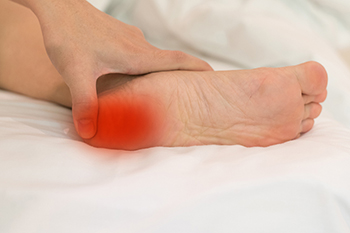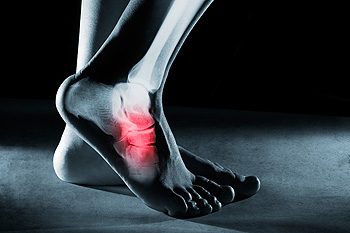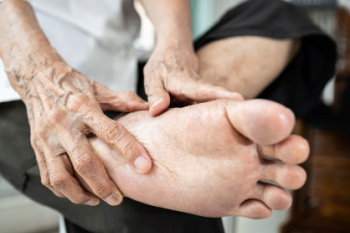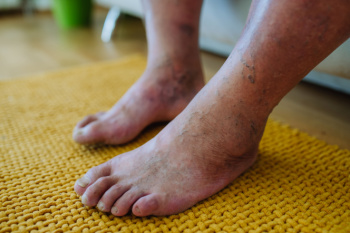159 North 3rd Street
Macclenny, Florida 32063

Sever's disease, also known as calcaneal apophysitis, is a common childhood condition characterized by heel pain caused by inflammation of the growth plate in the heel bone. It typically affects physically active children and adolescents, particularly those experiencing growth spurts during puberty. The condition occurs due to repetitive stress or tension on the growth plate and can be seen in active children involved in sports with running or jumping. Radiographic tests, such as X-rays or MRI scans, may be conducted to diagnose Sever's disease, ruling out other potential causes of heel pain and assessing the extent of inflammation or bone changes. If your child complains of heel pain, or if you notice them limping, it is suggested that you schedule an appointment with a podiatrist to help manage this condition.
Sever's disease often occurs in children and teens. If your child is experiencing foot or ankle pain, see Dr. John L. Coleman from Florida. Our doctor can treat your child’s foot and ankle needs.
Sever’s Disease
Sever’s disease is also known as calcaneal apophysitis, which is a medical condition that causes heel pain I none or both feet. The disease is known to affect children between the ages of 8 and 14.
Sever’s disease occurs when part of the child’s heel known as the growth plate (calcaneal epiphysis) is attached to the Achilles tendon. This area can suffer injury when the muscles and tendons of the growing foot do not keep pace with bone growth. Therefore, the constant pain which one experiences at the back of the heel will make the child unable to put any weight on the heel. The child is then forced to walk on their toes.
Symptoms
Acute pain – Pain associated with Sever’s disease is usually felt in the heel when the child engages in physical activity such as walking, jumping and or running.
Highly active – Children who are very active are among the most susceptible in experiencing Sever’s disease, because of the stress and tension placed on their feet.
If you have any questions, please feel free to contact our office located in Macclenny, FL . We offer the newest diagnostic and treatment technologies for all your foot and ankle injuries.

Multiple hereditary exostoses, or MHE, is a rare genetic disorder characterized by the development of multiple benign bone tumors, called osteochondromas, on the bones of the skeleton. These growths typically appear during childhood and adolescence and can affect various bones, including those in the feet and ankles. In the feet, MHE may lead to deformities, such as toe angulation, limb length discrepancies, and altered gait patterns. This can result in pain, limited mobility, and cosmetic concerns. If you have the symptoms described here, it is strongly suggested that you schedule an appointment with a podiatrist who can diagnose the problem and provide appropriate treatment. If it is an MHE-related foot and ankle issue, the podiatrist will determine if custom-made orthotic interventions that can provide support and improve foot function will be helpful, or if surgical interventions need to be performed that can correct deformities or remove problematic osteochondromas. If you have been afflicted with this rare foot condition, it is suggested that you are under the care of a podiatrist who can help you manage MHE.
Some foot conditions may require additional professional care. If you have any concerns, contact Dr. John L. Coleman of Florida. Our doctor can provide the care you need to keep you pain-free and on your feet.
Rare Foot Conditions
The majority of foot conditions are common and can be treated by a podiatrist. Standard diagnostic procedures are generally used to identify specific conditions and treatment can be rendered. A podiatrist also treats rare foot conditions which can be difficult to diagnose and may need extra attention and care.
There are many rare foot conditions that can affect children. Some of these can include:
Freiberg’s disease - This can be seen as a deterioration and flattening of a metatarsal bone that exists in the ball of the foot. It typically affects pre-teen and teenage girls, but can affect anyone at any age. Symptoms that can accompany this can be swelling, stiffness, and the patient may limp.
Kohler’s disease - This often targets the bone in the arch of the foot and affects younger boys. It can lead to an interruption of the blood supply which ultimately can lead to bone deterioration. The patient may limp or experience tenderness, swelling, and redness.
Maffucci syndrome - This affects the long bones in a child’s foot leading to the development of abnormal bone lesions. They are benign growths and typically develop in early childhood and the bones may be susceptible to breaking.
A podiatrist can properly diagnose and treat all types of rare foot conditions. If your child is affected by any of these symptoms or conditions, please don’t hesitate to call our office so the correct treatment method can begin.
If you have any questions please feel free to contact our office located in Macclenny, FL . We offer the newest diagnostic tools and technology to treat your foot and ankle needs.

Incorporating foot stretches into your post-run routine offers a multitude of benefits, helping your feet recover from the demands of running while reducing the risk of future injury. Toe curls, where you curl your toes downward and then upward, help strengthen the muscles in your feet and improve flexibility. Ankle rotations, performed by gently rotating your ankles in clockwise and counterclockwise motions, enhance ankle mobility and reduce stiffness. Additionally, plantar fascia stretches, achieved by gently pulling your toes towards you to stretch the arch of your foot, alleviate tension in the plantar fascia, and help prevent conditions like plantar fasciitis. Calf stretches, targeting the muscles in the lower leg, improve range of motion and prevent tightness during running. Finally, Achilles tendon stretches, where you lean against a wall with one foot back and gently press the heel towards the ground, increase flexibility and reduce strain on the Achilles tendon. By incorporating these stretches into your post-run routine, you can optimize performance, prevent injuries, and promote overall foot health. If you have endured a foot injury from running, it is suggested that you visit a podiatrist who can offer you appropriate treatment options, in addition to suggesting foot stretches that are best for you.
Stretching the feet is a great way to prevent injuries. If you have any concerns with your feet consult with Dr. John L. Coleman from Florida. Our doctor will assess your condition and provide you with quality foot and ankle treatment.
Stretching the Feet
Stretching the muscles in the foot is an important part in any physical activity. Feet that are tight can lead to less flexibility and make you more prone to injury. One of the most common forms of foot pain, plantar fasciitis, can be stretched out to help ease the pain. Stretching can not only ease pain from plantar fasciitis but also prevent it as well. However, it is important to see a podiatrist first if stretching is right for you. Podiatrists can also recommend other ways to stretch your feet. Once you know whether stretching is right for you, here are some excellent stretches you can do.
It is best to go easy when first stretching your foot and work your way up. If your foot starts hurting, stop exercising and ice and rest the foot. It is advised to then see a podiatrist for help.
If you have any questions, please feel free to contact our office located in Macclenny, FL . We offer the newest diagnostic and treatment technologies for all your foot care needs.

Rheumatoid arthritis, or RA, is an autoimmune disorder causing inflammation in joints, often leading to pain, stiffness, and swelling. It can affect any joint in the body, including those in the feet and ankles. Symptoms include joint tenderness, warmth, and deformities. In the feet, RA can result in bunions, hammertoes, and collapsed arches, impacting mobility, and causing discomfort. Long-term effects may include joint damage, disability, and reduced quality of life. RA commonly affects women more than men, typically starting between ages 30 and 60, but can occur at any age. While there is no cure for RA, management focuses on alleviating symptoms and preventing joint damage. If you have RA, it is strongly suggested that you schedule an appointment with a podiatrist who can provide specialized care for foot and ankle issues associated with RA and enhance your overall quality of life.
Because RA affects more than just your joints, including the joints in your feet and ankles, it is important to seek early diagnosis from your podiatrist if you feel like the pain in your feet might be caused by RA. For more information, contact Dr. John L. Coleman of Florida. Our doctor will assist you with all of your podiatric concerns.
What Is Rheumatoid Arthritis?
Rheumatoid Arthritis (RA) is an autoimmune disorder in which the body’s own immune system attacks the membranes surrounding the joints. Inflammation of the lining and eventually the destruction of the joint’s cartilage and bone occur, causing severe pain and immobility.
Rheumatoid Arthritis of the Feet
Although RA usually attacks multiple bones and joints throughout the entire body, almost 90 percent of cases result in pain in the foot or ankle area.
Symptoms
Diagnosis
Quick diagnosis of RA in the feet is important so that the podiatrist can treat the area effectively. Your doctor will ask you about your medical history, occupation, and lifestyle to determine the origin of the condition. Rheumatoid Factor tests help to determine if someone is affected by the disease.
If you have any questions please feel free to contact our office located in Macclenny, FL . We offer the newest diagnostic and treatment technologies for all your foot and ankle needs.

Diabetes can lead to various foot problems due to its effects on circulation and nerve function. Peripheral neuropathy, a common complication of diabetes, causes numbness, tingling, or loss of sensation in the feet, increasing the risk of injuries going unnoticed. Poor circulation can impair wound healing, leading to infections and ulcers. To give themselves the best chance of maintaining healthy feet, individuals with diabetes should prioritize proper foot care. This includes daily inspection for any cuts, blisters, or changes in skin color or temperature, wearing well-fitted shoes and socks, and keeping blood sugar levels under control. Regular visits to a podiatrist are important for diabetic foot care. Podiatrists can perform comprehensive foot exams, provide guidance on preventive measures, such as proper nail trimming and callus removal, and offer treatment for foot conditions, including wound care, infection management, and custom-made orthotic devices to alleviate pressure points. If you have diabetes, it is strongly suggested that you are under a podiatrist’s care to prevent and manage diabetic foot problems.
Diabetic foot care is important in preventing foot ailments such as ulcers. If you are suffering from diabetes or have any other concerns about your feet, contact Dr. John L. Coleman from Florida. Our doctor can provide the care you need to keep you pain-free and on your feet.
Diabetic Foot Care
Diabetes affects millions of people every year. The condition can damage blood vessels in many parts of the body, especially the feet. Because of this, taking care of your feet is essential if you have diabetes, and having a podiatrist help monitor your foot health is highly recommended.
The Importance of Caring for Your Feet
Patients with diabetes should have their doctor monitor their blood levels, as blood sugar levels play such a huge role in diabetic care. Monitoring these levels on a regular basis is highly advised.
It is always best to inform your healthcare professional of any concerns you may have regarding your feet, especially for diabetic patients. Early treatment and routine foot examinations are keys to maintaining proper health, especially because severe complications can arise if proper treatment is not applied.
If you have any questions please feel free to contact our office located in Macclenny, FL . We offer the newest diagnostic and treatment technologies for all your foot and ankle needs.